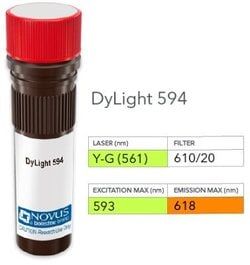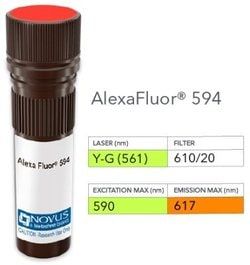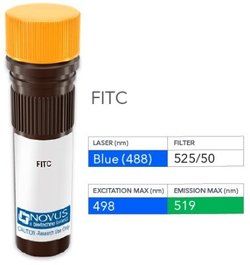CD34 Antibody (ICO-115), DyLight 594, Novus Biologicals™
Manufacturer: Novus Biologicals
Select a Size
| Pack Size | SKU | Availability | Price |
|---|---|---|---|
| Each of 1 | NB005610-Each-of-1 | In Stock | ₹ 58,562.00 |
NB005610 - Each of 1
In Stock
Quantity
1
Base Price: ₹ 58,562.00
GST (18%): ₹ 10,541.16
Total Price: ₹ 69,103.16
Antigen
CD34
Classification
Monoclonal
Conjugate
DyLight 594
Formulation
50mM Sodium Borate with 0.05% Sodium Azide
Gene Symbols
CD34
Immunogen
Blast cells from a chronic myeloid leukemia patient were used as the immunogen for the CD34 antibody.
Quantity
0.1 mL
Research Discipline
Adaptive Immunity, Angiogenesis, B Cell Development and Differentiation Markers, Breast Cancer, Cancer, Cell Biology, Cellular Markers, Endothelial Cell Markers, Hematopoietic Stem Cell Markers, Hypoxia, Immunology, Innate Immunity, Mast Cell Markers, Mesenchymal Stem Cell Markers, Myeloid Cell Markers, Myeloid derived Suppressor Cell, Neuronal Cell Markers, Neuroscience, Stem Cell Markers, Tumor Suppressors
Test Specificity
This antibody recognizes a carbohydrate epitope on a single chain, transmembrane, heavily glycosylated protein of 90-120kDa, which is identified as CD34 (VI international workshop on human differentiation antigens). Its expression is a hallmark for identifying pluripotent hematopoietic stem or progenitor cells. Its expression is gradually lost as lineage committed progenitors differentiate. CD34 is a marker of choice for staining blasts in acute myeloid leukemia. In addition, it is expressed by soft tissue tumors, such as solitary fibrous tumor and gastrointestinal stromal tumor. CD34 expression is also found in vascular endothelium. Additionally, proliferating endothelial cells overexpress this molecule than the non-proliferating endothelial cells. Anti-CD34 labels 85% of angiosarcoma and Kaposis sarcoma, but shows low specificity.
Content And Storage
Store at 4°C in the dark.
Applications
Western Blot, Flow Cytometry, Immunohistochemistry, Immunocytochemistry, Immunofluorescence, Immunohistochemistry (Paraffin)
Clone
ICO-115
Dilution
Western Blot, Flow Cytometry, Immunohistochemistry, Immunocytochemistry/Immunofluorescence, Immunohistochemistry-Paraffin, Immunohistochemistry-Frozen
Gene Alias
CD34 antigenhematopoietic progenitor cell antigen CD34, CD34 molecule
Host Species
Mouse
Purification Method
Protein G purified
Regulatory Status
RUO
Primary or Secondary
Primary
Target Species
Human, Rat
Isotype
IgG1 κ
Description
- CD34 Monoclonal specifically detects CD34 in Human, Rat samples
- It is validated for Flow Cytometry, ELISA, Immunocytochemistry/Immunofluorescence.




